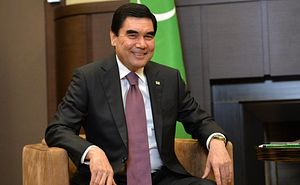Last summer’s coup attempt in Turkey precipitated not just a dark turn in domestic Turkish politics but also increased pressure on Ankara’s allies in Central Asia. Turkish President Recep Tayyip Erdoğan laid blame for the violence squarely on Fethullah Gülen, a former Erdoğan ally turned exile now residing in Pennsylvania, and the Gülen movement.
Several human rights organizations — including Human Rights Watch, Amnesty International, and the Norwegian Helsinki Committee — released a statement today outlining Ankara’s reach into Turkmenistan, where they say 18 men with some affiliation with either Turkmen-Turkish schools or the Gülen movement, were convicted of “various offenses relating primarily to incitement to social, ethnic, or religious hatred and involvement in a criminal organization,” according to a summary of the verdict viewed by Human Rights Watch.
The 18 men — reportedly among the more than 100 people detained last fall, most of which had some affiliation with the Gülen movement — were given sentences ranging from 12 to 25 years after closed trials. Human Rights Watch has been told that the men were tortured but notes in their release that a “lack of access to the men and of access by the men to independent medical treatment means it is not possible for Human Rights Watch to corroborate this.” Reports about torture in Turkmenistan are common, but difficult to verify as the country denies the accusation and allows neither journalists nor activists to investigate.
The men, according to the human rights organizations, were all “graduates, former teachers, or otherwise linked to Turkmen-Turkish schools or the International Turkmen-Turkish University.”
As in the rest of the Central Asian region, Gülen-financed schools were set up in the early 1990s. Freshly independent, the states of Central Asia had poor public school systems; the Gülen schools filled the gap. But the movement — pan-national and decidedly outside the bounds of state control — at times made Central Asia’s leaders uneasy. Samantha Brletich, writing for The Diplomat in 2015, noted that there were two reasons for the closure of seven schools linked to the Gülen movement in Tajikistan: First, it was “a response to the increase in Turkish influence in Tajik politics and signal a greater alignment with Ankara’s policies.” A second explanation was rooted in paranoia, “the fear that Gülen supporters (or any opposition group in Tajikistan) will attempt to create a parallel state and subvert the government.”
The same holds true for Turkmenistan. Most of the Gülen-linked schools that had opened in the 1990s in Turkmenistan were closed or nationalized in 2011. Nick Ashdown, writing for EurasiaNet last December, noted that rather than push back against Turkish demands to pursue Gülenists, as Kyrgyzstan and Kazakhstan had, Turkmenistan seemed to be acquiescing.
The sentences described by Human Rights Watch only bolster this conclusion. The schools may have been closed several years ago but their former teachers and students remain at risk because of their past affiliation and, frankly, Ashgabat’s need to keep amenable relations with Ankara.

































